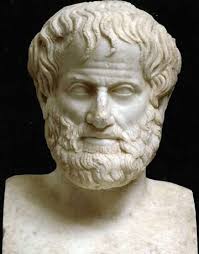Ética a Nicômaco (pdf/pt)
Metafísica / Ética à Nicômaco / Poética (pdf/pt)

Aristotle (/ˈærɪˌstɒtəl/; Greek: Ἀριστοτέλης [aristotélɛːs], Aristotélēs; 384 – 322 BC) was a Greek philosopher and scientist born in the Macedonian city of Stagira, Chalkidice, on the northern periphery of Classical Greece. His father, Nicomachus, died when Aristotle was a child, whereafter Proxenus of Atarneus became his guardian. At eighteen, he joined Plato’s Academy in Athens and remained there until the age of thirty-seven (c. 347 BC). His writings cover many subjects – including physics, biology, zoology, metaphysics, logic, ethics, aesthetics, poetry, theater, music, rhetoric, linguistics, politics and government – and constitute the first comprehensive system of Western philosophy. Shortly after Plato died, Aristotle left Athens and, at the request of Philip of Macedon, tutored Alexander the Great starting from 343 BC. According to the Encyclopædia Britannica, “Aristotle was the first genuine scientist in history … [and] every scientist is in his debt.”
Teaching Alexander the Great gave Aristotle many opportunities and an abundance of supplies. He established a library in the Lyceum which aided in the production of many of his hundreds of books. The fact that Aristotle was a pupil of Plato contributed to his former views of Platonism, but, following Plato’s death, Aristotle immersed himself in empirical studies and shifted from Platonism to empiricism. He believed all peoples’ concepts and all of their knowledge was ultimately based on perception. Aristotle’s views on natural sciences represent the groundwork underlying many of his works. Continuar lendo →
 A respected scholar of ancient philosophy, Jonathan Barnes, once said-indeed wrote-that if Aristotle were alive today he would undoubtedly live in Oxford, taking a few side trips to Louvain perhaps. A no less respected Italian specialist in Greek philosophy retorted that, if Aristotle were to have lived in our century, he would have at least spent his vacations in Padua. Overworking the anachronism, I would add: had Aristotle lived in our century, he would not have lived in Oxford for the sake of discussion with Jonathan Barnes, nor would he have stayed over in Louvain or Padua; rather, he would have preferred philosophizing in the Black Forest with Heidegger.
A respected scholar of ancient philosophy, Jonathan Barnes, once said-indeed wrote-that if Aristotle were alive today he would undoubtedly live in Oxford, taking a few side trips to Louvain perhaps. A no less respected Italian specialist in Greek philosophy retorted that, if Aristotle were to have lived in our century, he would have at least spent his vacations in Padua. Overworking the anachronism, I would add: had Aristotle lived in our century, he would not have lived in Oxford for the sake of discussion with Jonathan Barnes, nor would he have stayed over in Louvain or Padua; rather, he would have preferred philosophizing in the Black Forest with Heidegger.